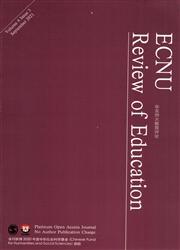当光明熄灭:教学中的无知与多元
IF 2.7
Q1 EDUCATION & EDUCATIONAL RESEARCH
引用次数: 0
摘要
如果教育是从黑暗走向光明的运动,那么光明的熄灭意味着什么?在这个问题之后,本文探讨了无知的概念是如何告知并嵌入到学习和教育学的观念中的。通过历史和当代的例子,我想知道,将无知理解为缺席是如何构建某种形式的教学和学习的,如何以不同的方式理解无知,以及如何以不同的方式描述无知,为想象教学和学习创造可能性。无知作为缺席的框架阐明了知道和不知道之间的距离,这定义了我所说的解释性时空。这种安排将无知定位为一个社会问题,将学校教育定位为旨在缩小差距的解决方案。我指出,这种框架在今天的研究和实践中仍然存在,这些研究和实践认为,获得积极知识和消除消极无知是教育的首要责任。通过对科学技术研究、精神分析和教育哲学的研究,我认为,关于无知的其他概念通常与缺席有关。在此基础上,我想问,如何通过多样性,即在一个被称为知识的东西可以凝聚的可能性领域内,重新构建无知,提供一种不同的框架和教学安排。最后,我探讨了如何在多元时空中重构无知,为理解和制定教学遭遇打开了可能性。本文章由计算机程序翻译,如有差异,请以英文原文为准。
When the Light Goes Out: Ignorance and Multiplicity in Teaching and Learning
If education is the movement from dark to light, what does it mean for the light to go out? Following this question, this paper examines how conceptions of ignorance inform and are embedded in ideas of learning and pedagogy. Through historical and contemporary examples, I ask how an understanding of ignorance as absence frames some forms of teaching and learning, how ignorance might be understood differently, and how a different formulation of ignorance creates possibilities for imagining teaching and learning otherwise. The framing of ignorance as absence articulates a distance between knowing and not knowing that defines what I call explicatory spacetime. This arrangement positions ignorance as a social problem and schooling as a solution aimed at closing the gap. I point to ways this framing persists today in research and practices that posit the acquisition of positive knowledge and the eradication of negative ignorance as a foremost educational responsibility. Engaging work across science and technology studies, psychoanalysis, and the philosophy of education, I argue that alternative conceptions of ignorance often maintain associations with absence. Building from this scholarship, I ask how reframing ignorance through multiplicity, that is, within a field of possibility out of which a thing called knowledge can cohere, offers a different framework and pedagogical arrangements. Finally, I explore how reframing ignorance in a spacetime of multiplicity opens possibilities for understanding and enacting pedagogical encounters.
求助全文
通过发布文献求助,成功后即可免费获取论文全文。
去求助
来源期刊

ECNU Review of Education
Social Sciences-Education
CiteScore
4.90
自引率
0.00%
发文量
41
审稿时长
10 weeks
 求助内容:
求助内容: 应助结果提醒方式:
应助结果提醒方式:


